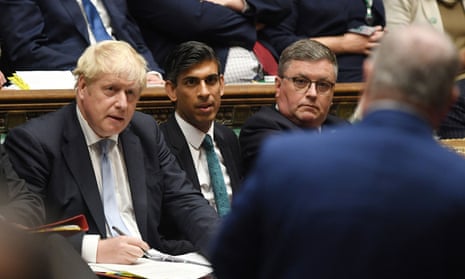We can’t have clean politics if politics is awash with money from obscure sources. That’s why MPs have today tabled the “Pandora amendments” to the elections bill to stop millions of pounds pouring into British political parties from secretive offshore locations.
Thanks to the Guardian’s courageous reporting of the Pandora papers, we now know the staggering scale of generous donors with offshore accounts and a fondness for a Brexiteering Tory party.
Take the Chernukhins. Lubov Chernukhin has now donated £2.1m to the Conservative party. Yet the BBC revealed her husband, Vladimir Chernukhin (appointed deputy chairman of Vnesheconombank by Vladimir Putin) received $8m from Suleiman Kerimov, a Russian billionaire who has been sanctioned by the US treasury on the grounds of his associations with the Russian government. The transfer came on 29 April 2016, shortly before the majority of Lubov Chernukhin’s donations to the Conservatives. (She has denied ever receiving money deriving from Kerimov, and says that her Tory donations “have never been tainted by Kremlin or any other influence”.)
Then there’s Alexander Temerko, who operated at the top of the Russian arms industry and had connections high up in the Kremlin before moving to the UK in 2005. OpenDemocracy reported that he donated more than £1.2m to the Tories between 2012 and 2019.
Next there’s Mohamed Amersi who, with his partner, has given £793,000 to the Conservative party. As the BBC reported, Amersi advised one of the parties involved in “one of Europe’s biggest corruption scandals”, which saw $220m being paid to a Gibraltar-based company that was secretly owned through an offshore company by Gulnara Karimova, the daughter of the then president of Uzbekistan, Islam Karimov. (Amersi has denied any wrongdoing.) The Financial Times reported that Amersi “received $4m from a company he knew to be secretly owned by a powerful Russian who was at the time a senior member of Vladimir Putin’s regime” – Leonid Reiman, then Putin’s telecoms minister. In response, Amersi said he “wasn’t aware” that Reiman owned the company, and he has always maintained that his donation to the Conservatives came from his own UK profits.
Meanwhile, some generous donors are good friends with the new Tory chairman, “Bonanza” Ben Elliot, who has promised the wealthy access to Tory politicians in exchange for donations.
Right now, Britain is defenceless to stop this tide. Carole Cadwalladr’s investigations helped expose the fact that Arron Banks’s donations to Leave.EU were financed with multimillion-pound loans from his Isle of Man-based firm, Rock Holdings. The National Crime Agency eventually dropped its investigation but failed to explain just how the money arrived in Rock Holdings in the first place. Bluntly, why didn’t it tell us where the cash came from? Surely we have a right to know? The Electoral Commission was so worried by the NCA’s conclusion in the Banks case that it warned the outcome raised concerns about the “apparent weakness” in the law that risks allowing “overseas funds into UK politics”.
That’s why a cross-party group of MPs has tabled the “Pandora amendments” to insist that party donations must come from profits made in the UK, and to establish a new call-in regime that allows the Electoral Commission to investigate suspicious donations on national security grounds. The government has just introduced this regime for investments in critical national infrastructure, so why not “investments” in political parties too?
When it has been approached with questions about the provenance of certain donations, the Conservative party has said that fundraising is a “legitimate part” of the democratic process, and that all donations have been properly declared to the Electoral Commission.
Yet the warnings are loud and clear. Last month, the Chatham House thinktank warned that “Westminster – and the Conservative parliamentary party in particular – may be open to influence from wealthy donors who originate from post-Soviet kleptocracies, and who may retain fealty to these regimes”. Parliament’s intelligence select committee has questioned whether the Electoral Commission has sufficient powers to ensure the security of democratic processes where hostile state threats are involved. “If it [the Electoral Commission] is to tackle foreign interference, then it must be given the necessary legislative powers,” the committee concluded.
The time for delay is over. It is now time to act.
Liam Byrne is the Labour MP for Birmingham Hodge Hill
